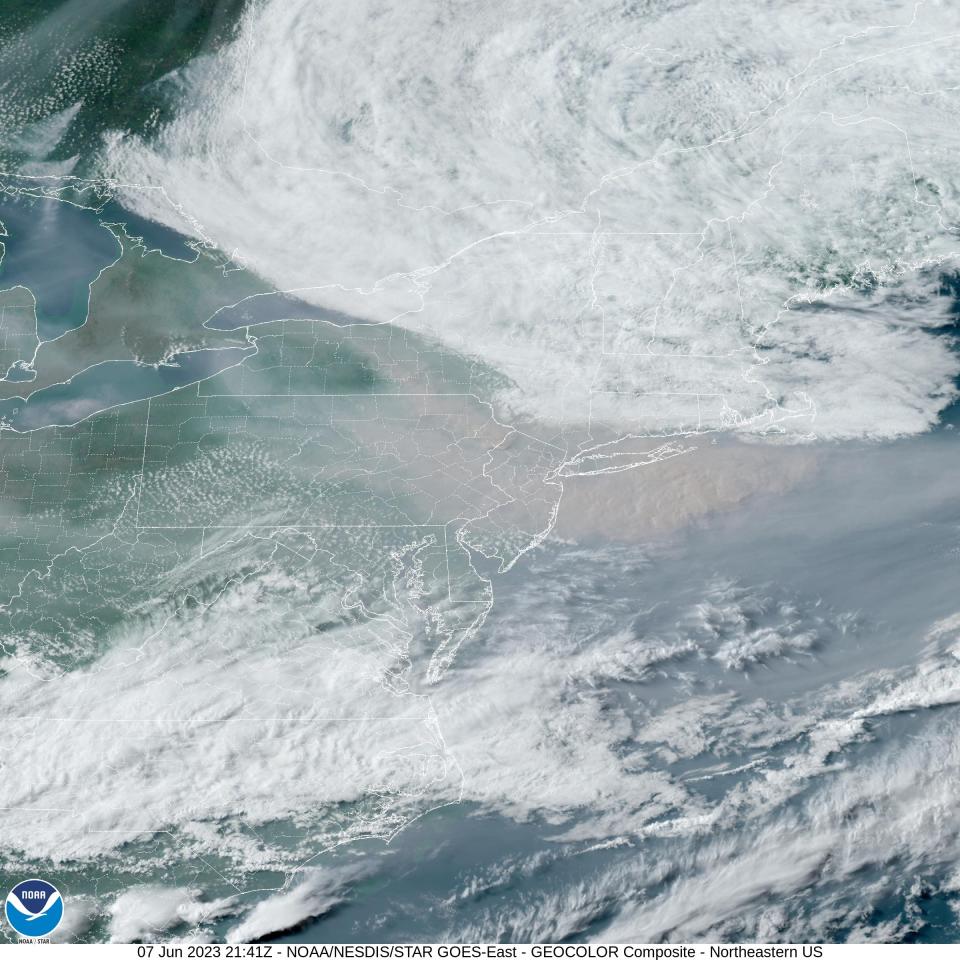When will the air quality improve, what precautions can we take?
Our region will be impacted by poor air quality for the third straight day Thursday by smoke from the Canadian wildfires.
The New Jersey Department of Environmental Protection has been issuing alerts because the air quality is unhealthy and can impact the elderly, children and those with conditions such as asthma, and heart and lung disease.
What is causing all the smoke?
The Canadian wildfires. A wildfire in Jackson certainly contributed to the smoke, but the bulk of it has been bellowing down from Canada. It's reached as far south as Delaware as firefighters continue to battle the massive blaze.
What does hazardous air quality mean?
Hazardous air quality is a term used to describe air that is so polluted that it can cause serious health problems, including respiratory problems, heart disease, and cancer. Hazardous air quality is often caused by high levels of pollutants such as ozone, particulate matter, and sulfur dioxide.
The Air Quality Index is a scale used to measure air quality. An AQI value of 300 or higher indicates hazardous air quality. When the AQI is in the hazardous range, everyone is at risk for health problems, even healthy people. People with heart or lung disease, older adults, and children are at even greater risk.
Is the air quality a risk to my health? Here's what you need to know and what you can do
AQI hourly reports: Smoke creates hazardous air quality in NJ
When will air quality improve?
It is difficult to say exactly when the air quality will improve. It depends on a number of factors, including the weather and the amount of pollution in the air.
The weather pattern is not going to change much through the weekend. A stalled low-pressure system near Maine and the Canadian Maritime Provinces will sustain northerly winds from the fires in Quebec, directing the smoke into portions of the northeastern U.S. pic.twitter.com/Z1kzXnBz3T
— NWS New York NY (@NWSNewYorkNY) June 7, 2023
Is it safe to be outside?
Short answer, no. It is important to take steps to protect your health when air quality is poor. These steps include:
Stay indoors as much as possible. If you must go outside, wear a mask that can filter out pollutants.
Avoid strenuous activity.
Drink plenty of fluids.
Monitor your health closely.
If you experience any health problems, such as difficulty breathing, chest pain, or nausea, seek medical attention immediately.
Should I keep my pets indoors?
Pets have lungs and hearts too. Do your best to limit your pet's time outside. Your dog might not like it, but cut the walk short. Hazardous air quality can irritate the lungs and airways of both humans and pets, causing respiratory problems such as asthma, bronchitis, and pneumonia. In severe cases, it can even be fatal.
Here are some tips for keeping your pets safe during periods of poor air quality:
Keep them indoors as much as possible. If you must take them outside, keep their time outdoors short and make sure they are wearing a mask.
Provide them with plenty of fresh water. Breathing in polluted air can make pets dehydrated, so it's important to make sure they have plenty of fresh water to drink.
Monitor their health closely. If you notice any changes in their behavior, such as increased coughing or wheezing, or if they start to exhibit signs of respiratory distress, such as difficulty breathing or bluish gums, contact your veterinarian immediately.

Can I open my windows?
It is not recommended to open your windows if the air quality is bad. Hazardous air quality can irritate the lungs and airways of both humans and pets, causing respiratory problems such as asthma, bronchitis, and pneumonia. In severe cases, it can even be fatal.
If you must open your windows, keep them open for a short period of time and close them as soon as possible. You can also use an air purifier to help remove pollutants from the air.
Will wearing a mask help with air quality alerts?
Yes, if air quality is bad, you should wear a mask. A mask can help to filter out pollutants from the air, making it safer to breathe.
Here are some tips for choosing a mask:
Choose a mask that fits snugly against your face. A loose-fitting mask will not be effective at filtering out pollutants.
Choose a mask that is made of a material that can filter out pollutants. Some masks are made of materials that are not effective at filtering out pollutants.
Choose a mask that is comfortable to wear. You will be more likely to wear a mask if it is comfortable.
Here are some tips for wearing a mask:
Wash your hands before putting on the mask. This will help to prevent the spread of germs.
Adjust the mask so that it fits snugly against your face. There should be no gaps between the mask and your face.
Secure the mask with the straps. The straps should be tight enough to keep the mask in place, but not so tight that they are uncomfortable.
Do not touch your face while you are wearing the mask. This can contaminate the mask and make it less effective at filtering out pollutants.
Change your mask if it becomes wet or dirty. A wet or dirty mask will not be effective at filtering out pollutants.
Will air quality be better tomorrow?
Most likely, no. The National Weather Service says the smoke will stick around through the weekend, if not even longer. According to a tweet: "As long as the wildfires in Canada remain large, uncontained, and active, they will likely continue to generate smoke. So in the next week or two at the very least, a lot will be determined by the wind direction and where that causes the smoke to spread."
This article originally appeared on Asbury Park Press: Hazardous levels of air quality continue in N.J. due to wildfire smoke

